Why Professional HVAC Diagnostic Services Matter More Than You Think
An hvac diagnostic service is a comprehensive evaluation of your heating and cooling system by a trained technician. It identifies problems, assesses performance, and ensures safe operation.
Key Components of HVAC Diagnostic Service:
- Visual inspection of all system components
- Testing system operation and performance
- Checking electrical connections and safety controls
- Measuring airflow and temperature differences
- Verifying refrigerant levels and pressure readings
- Examining thermostat calibration and communication
- Inspecting ductwork for leaks or blockages
Why It's Important:
- Identifies root causes of problems (not just symptoms)
- Prevents costly emergency breakdowns
- Ensures safe system operation
- Improves energy efficiency and extends system life
When your HVAC system acts up, you might see ads for "free diagnostics." The reality is that genuine diagnostic work requires time, expertise, and specialized tools—and that has real value.
Many "free" offers are marketing tactics designed to get technicians into your home, where high-pressure sales tactics often follow. Legitimate diagnostic fees, typically ranging from $75 to $150, represent a fair exchange for professional expertise.
Understanding the difference between a genuine diagnostic service and a sales pitch can save you money and frustration. A proper diagnosis involves systematic testing, specialized equipment, and the knowledge to interpret results accurately.
Your home's comfort and safety deserve more than a quick glance—they deserve a thorough professional assessment that identifies real problems and provides honest solutions.
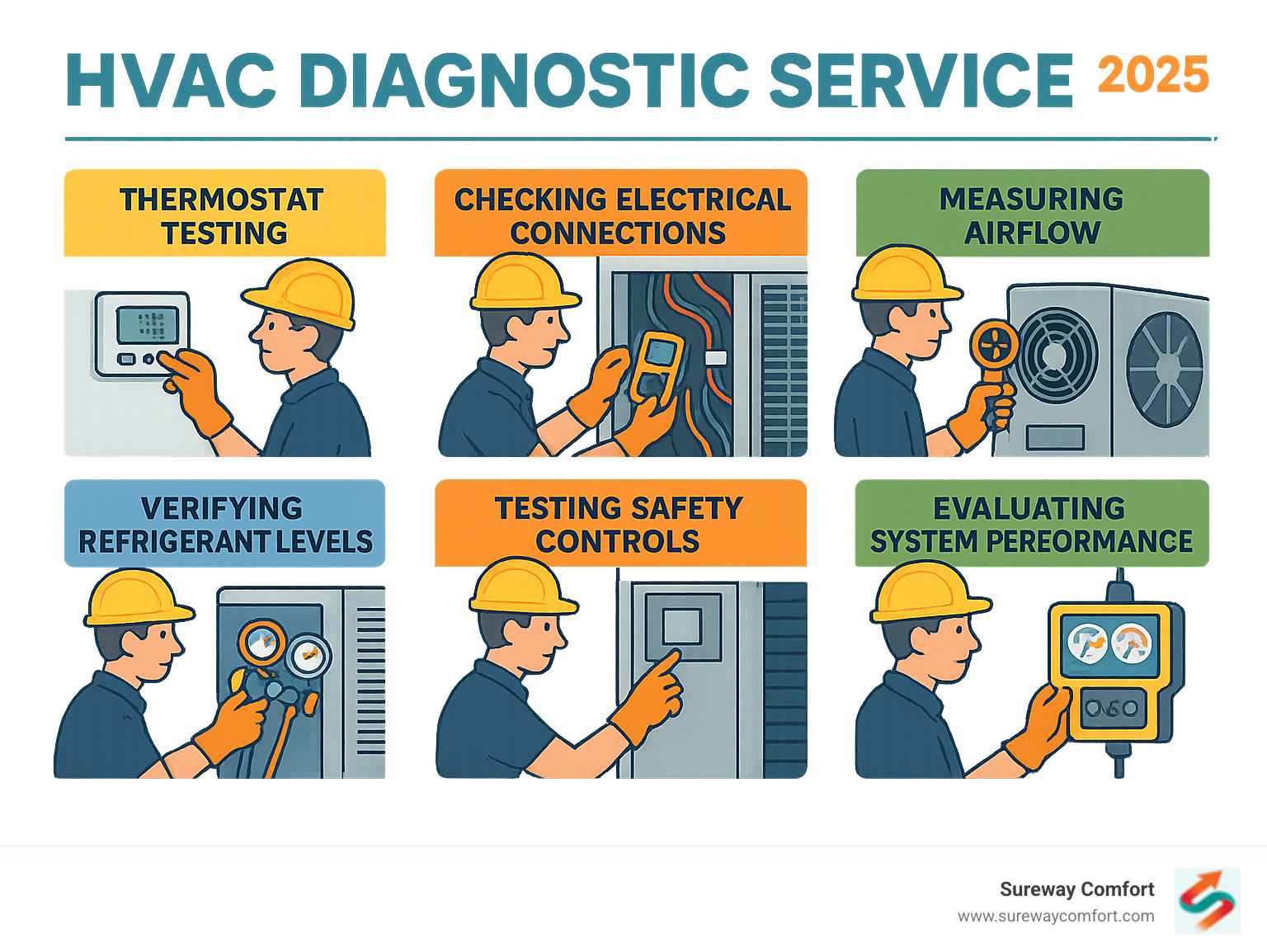
Quick hvac diagnostic service terms:
What is a Professional HVAC Diagnostic (And Why It's Not Just a "Quick Look")
When your heating or cooling system acts up, a quick glance isn't enough to find the real culprit. A professional hvac diagnostic service is invaluable for pinpointing the root cause of the problem.
A professional diagnostic is like a mechanic using specialized equipment, not just popping the hood. It's a systematic process that goes far beyond a visual inspection. Our experienced technicians use specialized tools and training for comprehensive problem identification and root cause analysis.
During a diagnostic, we evaluate your entire system's performance. We dig deeper than the symptoms to understand why it's failing, helping to catch issues before they become expensive emergencies.
The safety inspection is crucial. We check for dangerous problems like gas leaks, faulty electrical connections, or carbon monoxide risks from a compromised heat exchanger. You don't want to find these issues the hard way.
By investing in a comprehensive diagnostic, you're solving today's problem while preventing future breakdowns and extending your system's lifespan. It's a thorough physical exam for your HVAC system.
Common Signs You Need a Diagnostic Check
Your HVAC system communicates when something is wrong. Recognizing these warning signs can save you from a complete breakdown and emergency repair bills.
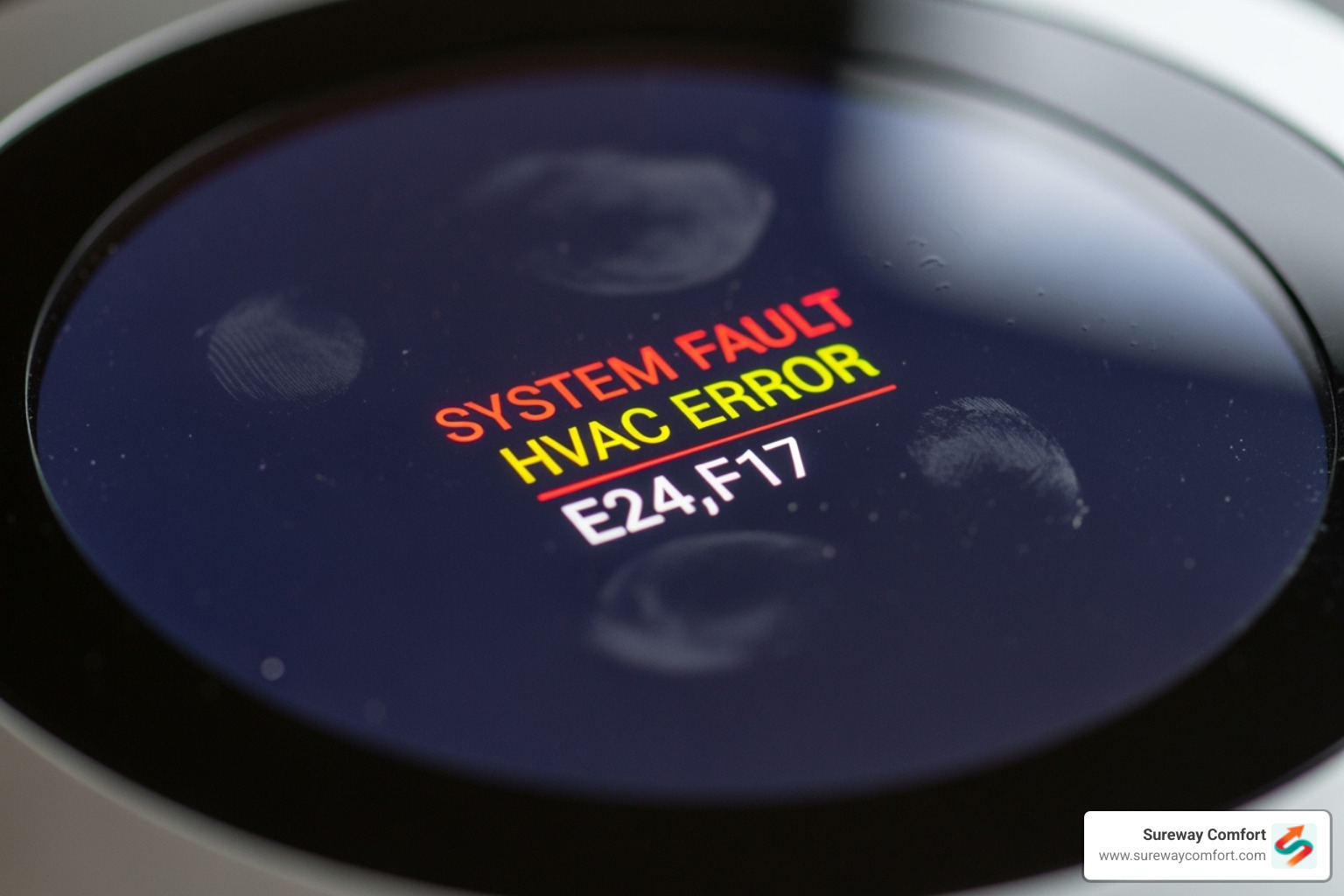
Uneven heating or cooling is a common complaint. If some rooms are hot while others are cold, it could indicate issues with blower components, blocked vents, or ductwork.
Strange noises are your system's cry for help. Rattling can mean loose parts, while squealing often points to worn belts or bearings. Banging or hissing are serious red flags that need immediate attention.
Unusual odors tell a story. A burning smell can signal electrical issues, while musty odors may indicate mold. If you smell gas, turn off your system immediately and call for help.
Increased energy bills without a change in usage mean your system is working harder than it should. Inefficient components force the system to run longer to maintain temperatures.
Poor airflow from your vents can stem from clogged air filters, blocked ductwork, or failing blower motors. The problem often worsens gradually.
System short cycling is when your unit turns on and off frequently without completing a full cycle. It strains your equipment and often indicates thermostat or internal system issues.
Water leaks or frozen coils are serious signs requiring immediate attention. They can cause water damage and indicate problems with refrigerant, drainage, or airflow.
The Difference Between a Diagnostic Fee and a Service Call Fee
The difference between diagnostic and service call fees can be confusing, especially when you're dealing with a broken system.
A diagnostic fee covers the detective work to find what's wrong. It pays for the technician's time, expertise, tools, and detailed assessment, acknowledging the complexity of modern HVAC systems.
A service call fee, on the other hand, is more like a basic trip charge, common in trades where problems are obvious, like a leaking pipe.
FeatureDiagnostic FeeService Call FeePurposeIdentify root cause of complex HVAC issuesBasic trip charge for obvious problemsWhat's CoveredTechnician expertise, diagnostic tools, detailed reportTravel cost, basic assessmentValueProblem-solving and prevention insightsAccess to a technicianWhen UsedComplex or unknown system problemsSimple, easily identified issues
When we charge a diagnostic fee for our hvac diagnostic service, we're ensuring our technicians can properly assess your system without rushing. This protects you from unnecessary repairs and identifies the real problem, not just a symptom.
The fee also ensures our assessment is unbiased. We provide honest recommendations based on your system's actual needs.
The Professional HVAC Diagnostic Service Checklist
When you call us for an hvac diagnostic service, you get a methodical, systematic process refined over years. Our technicians use specialized tools to uncover hidden problems in your system.
Your HVAC system is a puzzle. We don't just look at obvious spots; we examine every connection, test each component, and measure performance to reveal your system's true health.
Our approach follows strict safety protocols, as your family's well-being is our priority. We look for dangerous issues, not just inconveniences. Afterward, you'll get a comprehensive report explaining our findings, why they matter, and your options.
This systematic approach provides confidence. No guesswork, just clear answers backed by professional expertise and the right tools for the job.
What to Expect During a Professional HVAC Diagnostic Service
When our technician arrives, they bring a proven process that covers every critical aspect of your system. Here's what happens during your visit:
We start by checking thermostat calibration. Often, the problem is with the thermostat, not the HVAC unit itself. An inaccurate thermostat can cause many comfort issues.
Next is inspecting electrical connections. Loose connections can cause performance issues and are potential fire hazards. We check for wear and tighten all connections.
We will be cleaning or replacing air filters if needed. A dirty filter restricts airflow, impacting efficiency and air quality. Air filters are simple but crucial.
For cooling systems, measuring refrigerant levels is crucial. Incorrect levels cause the system to work harder or can damage components. We use precise instruments for accuracy.
We also spend time inspecting the condensate drain. A blocked drain can cause flooding and significant water damage if ignored.
Testing system controls ensures the system cycles correctly. Faulty controls can cause the system to overwork.
Examining blower components is key. The blower is the lungs of your system, and proper adjustments can improve efficiency by up to 15%, saving you money.
For gas systems, checking for gas leaks is a non-negotiable safety step. We test every connection and fitting to prevent dangerous situations.
Finally, we perform an inspection of the heat exchanger on furnaces. This is a critical safety check, as a cracked heat exchanger can leak deadly, odorless carbon monoxide into your home.
Advanced Diagnostics: Beyond the Standard Check-Up
Modern hvac diagnostic service uses advanced, predictive technology to spot problems before they cause a complete system failure.
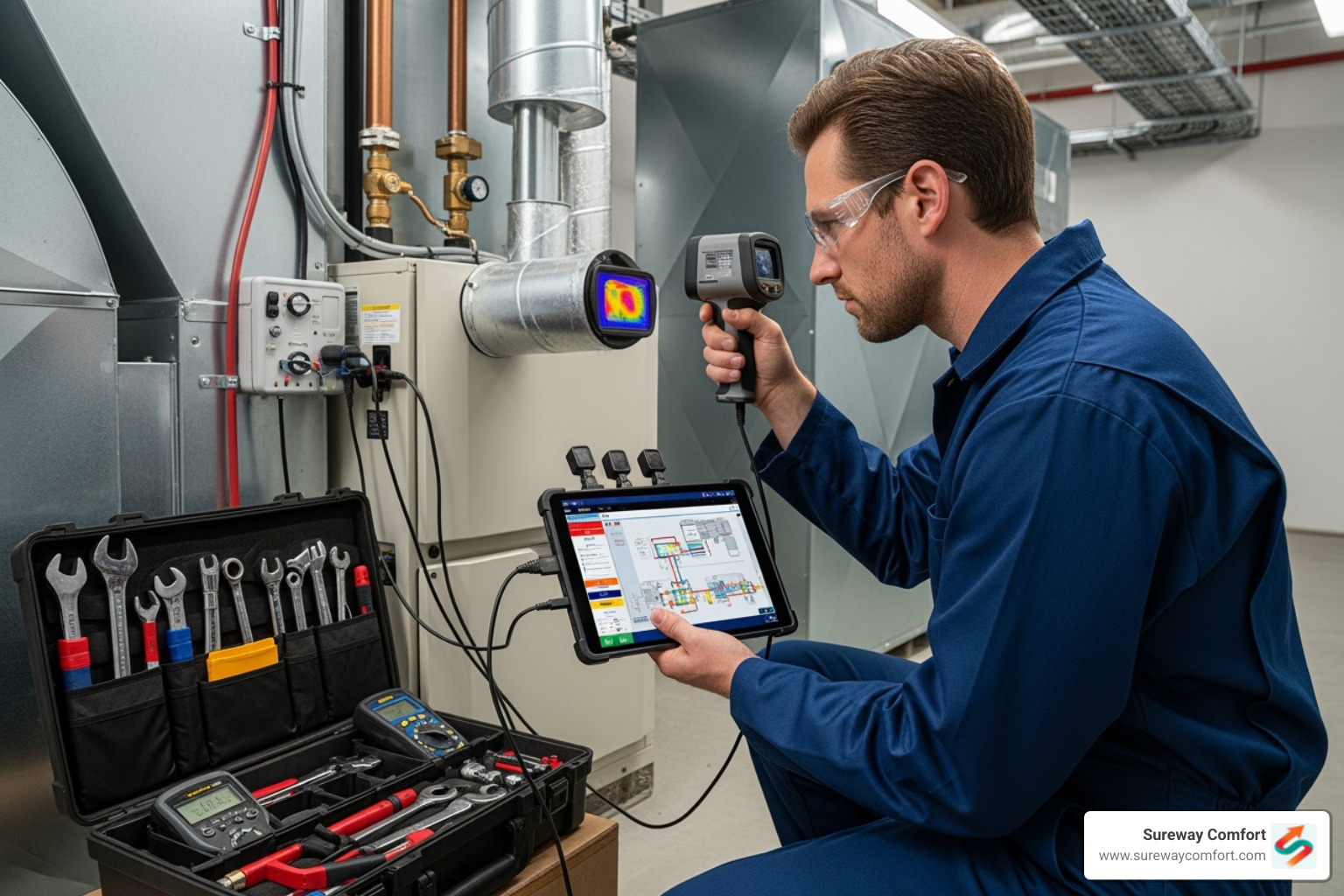
Vibration analysis is a powerful tool. Unusual vibrations indicate that a part is wearing out, loose, or was installed incorrectly. Catching this early can prevent major repairs.
Our data-driven recommendations are based on comparing your system's performance to thousands of others. This allows us to predict likely component failures and help you plan.
Smart connected systems are a game-changer. They monitor themselves and can alert us to problems before you even notice them, providing 24/7 oversight.
This advanced approach identifies issues traditional methods might miss, like sources of noise, vibrations, or gradual efficiency loss. The goal is to catch small problems before they become big expenses.
Decoding the Bill: The Myth of the "Free" Diagnosis
A "free hvac diagnostic service" sounds like a great deal, but in the HVAC world, "free" often has strings attached that can cost you more in the long run.
Genuine diagnostic work has value. "Free" offers are often bait-and-switch tactics. Once inside, homeowners may face high-pressure sales for expensive, unnecessary repairs or replacements.
A proper diagnostic involves a trained technician with specialized equipment. It also includes the costs of a stocked vehicle, fuel, maintenance, insurance and licensing, and other business overhead.
These business operating costs are real. With "free" service, costs are often shifted to inflated repair prices or upselling. The "free" diagnosis can become an expensive lesson.
Technician time and skill have genuine value. A thorough diagnostic requires careful testing and analysis. Companies that don't charge for this expertise upfront may push unnecessary repairs to compensate.
The Real Cost of an HVAC Diagnostic Service
So, what should an honest hvac diagnostic service cost? Reputable companies charge a reasonable range that reflects the value of their expertise and thorough evaluation.
Several factors influence the cost. Emergency service fees apply outside normal business hours. System complexity also matters, as older or multi-zone systems may require more time to diagnose.
Your geographic location also affects pricing. Many honest companies, like Sureway Comfort, follow a fair policy where the diagnostic fee gets waived with repair. If you approve the work, the fee is credited to your bill.
This approach is fair: the diagnostic work is compensated, and you get value if you proceed with repairs. You only pay the diagnostic fee if you decline the recommended solution.
What to Look For in a Qualified Technician
Not all technicians are equal. For your home's comfort and safety, qualifications matter. A reliable hvac diagnostic service depends on the technician performing it.
Look for proper certifications like NATE or ACE. These represent rigorous testing and proven expertise in HVAC skills.
State licensing is non-negotiable. Ensure the technician and company are licensed in Pennsylvania, which confirms they meet state standards for your protection.
Check for insurance and bonding. A reputable company will be fully insured to protect you if anything goes wrong, demonstrating professionalism.
Years of experience are invaluable. Experienced technicians have seen a wider range of issues and can diagnose complex problems more efficiently.
Read positive customer reviews from local homeowners. Look for comments on thoroughness, clear communication, and honesty.
Observe the technician's professionalism. Punctuality, a clean uniform, a well-organized vehicle, and clear communication are all signs of quality work.
Before You Call: Simple DIY Troubleshooting Steps
Before scheduling a professional hvac diagnostic service, you can often solve common HVAC problems yourself. Sometimes the solution is simple, saving you time and money.
That said, safety always comes first. Before any troubleshooting, turn off the power to your HVAC unit at the circuit breaker. This is essential for your safety. Use insulated tools and wear safety gloves when handling components.
Basic Checks for Every Homeowner
Let's walk through the most effective troubleshooting steps that every homeowner can handle. These simple checks solve more problems than you might expect.
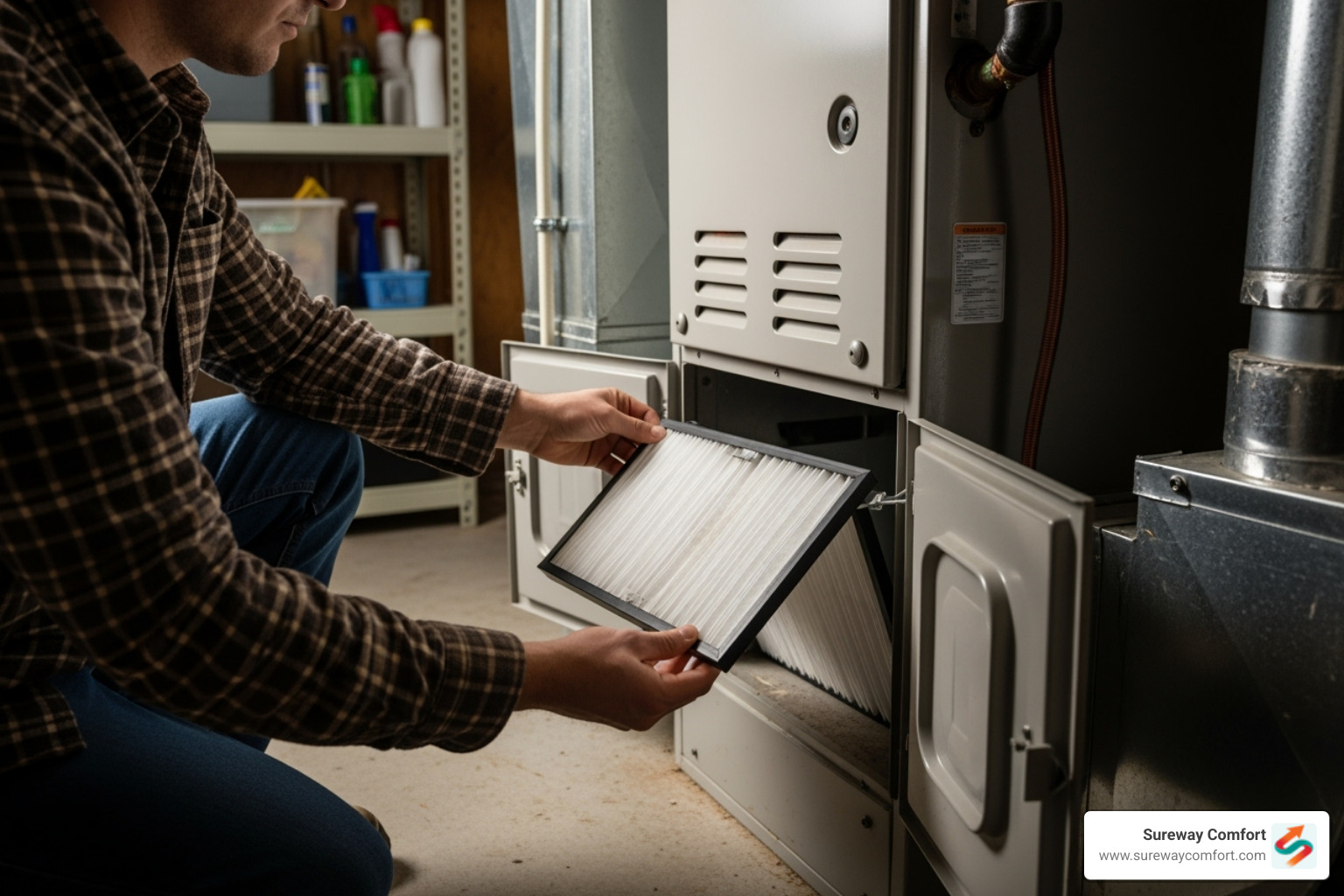
Start with your thermostat settings—it sounds almost too simple, but it's often the culprit. Make sure it's set to the right mode (heating or cooling) and that the temperature setting is correct. Double-check that it's not set to "off" or "fan only."
Replace those thermostat batteries next. If your thermostat display is dim or unresponsive, weak batteries are often the problem.
Check your circuit breaker if your system won't turn on. Head to your electrical panel and look for any tripped breakers labeled for your HVAC system. Reset it by flipping it back to the "on" position.
Change your air filter—this simple step prevents more problems than almost anything else. A clogged filter restricts airflow, makes your system work harder, and can even cause it to shut down. Check your filter monthly and replace it every one to three months.
Clear debris from your outdoor unit because your condenser needs room to breathe. Remove any leaves, grass clippings, or other debris blocking the unit. Keep at least two feet of clear space around the entire unit for proper airflow.
Make sure all your vents are open and unblocked throughout your home. Furniture, curtains, or rugs can accidentally block vents, creating hot and cold spots.
These basic steps solve a surprising number of HVAC issues. For more detailed guidance, you can check out this comprehensive DIY HVAC Troubleshooting Guide.
If these steps don't work, it's time to call the professionals. Some problems require the specialized tools and training of a thorough hvac diagnostic service. We're here to handle the complex issues for you.
Frequently Asked Questions about HVAC Diagnostics
Homeowners considering an hvac diagnostic service often have questions. Understanding the process helps our customers feel more confident in their investment.
How long does an HVAC diagnostic take?
A comprehensive diagnostic doesn't take all day. A typical diagnostic service takes 60-90 minutes, though this can vary depending on the complexity of the issue.
The time reflects our thoroughness. A simple issue may take an hour, while a complex problem requiring more testing could take 90 minutes or more.
A thorough technician will never rush the process. Taking extra time to get it right prevents future issues and service calls. It's an investment in accuracy.
Will the diagnostic fee be applied to the repair cost?
This is a common and smart question. Many reputable companies, including Sureway Comfort, credit the diagnostic fee toward the repair cost if you approve the work during the same visit.
This policy is fair. You get the value of our diagnostic expertise, and you don't pay twice if you proceed with repairs. If you choose not to proceed, the fee covers the diagnostic service provided.
Always confirm this policy upfront when scheduling your service to avoid surprises on your bill.
Is a diagnostic the same as a maintenance tune-up?
This is an excellent question. No, a diagnostic is not the same as a maintenance tune-up, though both are valuable services.
A diagnostic is like a doctor's visit when you're sick. It's performed to find the cause of a specific problem, like a system not cooling, making strange noises, or not working at all.
A maintenance tune-up is like an annual physical. It's a preventative service to keep your system healthy and efficient, catching potential problems early. During a tune-up, we clean and inspect your system to ensure everything is running efficiently.
While a tune-up might uncover issues, its primary goal is proactive system care rather than problem-solving. Both services are important for different reasons.
Conclusion: Making the Right Call for Your Home's Comfort
When your HVAC system acts up, you can chase "free" offers or invest in a genuine hvac diagnostic service that delivers real value. You now understand the difference between a gimmick and professional expertise.
Choosing a quality diagnostic service is a smart investment in your home's future. A thorough assessment helps you prioritize safety and efficiency and prevent inconvenient breakdowns.
Empowered decision-making starts with understanding what you're paying for. Proper diagnostics provide systematic problem-solving, specialized tools, safety checks, and peace of mind. You're investing in system health by catching small issues before they become costly.
At Sureway Comfort, we believe your home's comfort deserves more than guesswork. Our experienced technicians bring years of expertise to every diagnostic visit, following a streamlined process that gets to the root of problems quickly and efficiently. We serve homeowners throughout Bridgeville, South Fayette, Upper St. Clair, Mt. Lebanon, McDonald, Scott Township, Canonsburg, and Bethel Park with transparent pricing and honest assessments.
Your heating and cooling system works hard to keep your family comfortable. When it needs help, give it the professional attention it deserves.
For reliable diagnostics and transparent pricing on your heating and cooling system, it's time to schedule your AC repair in Mt. Lebanon, PA.



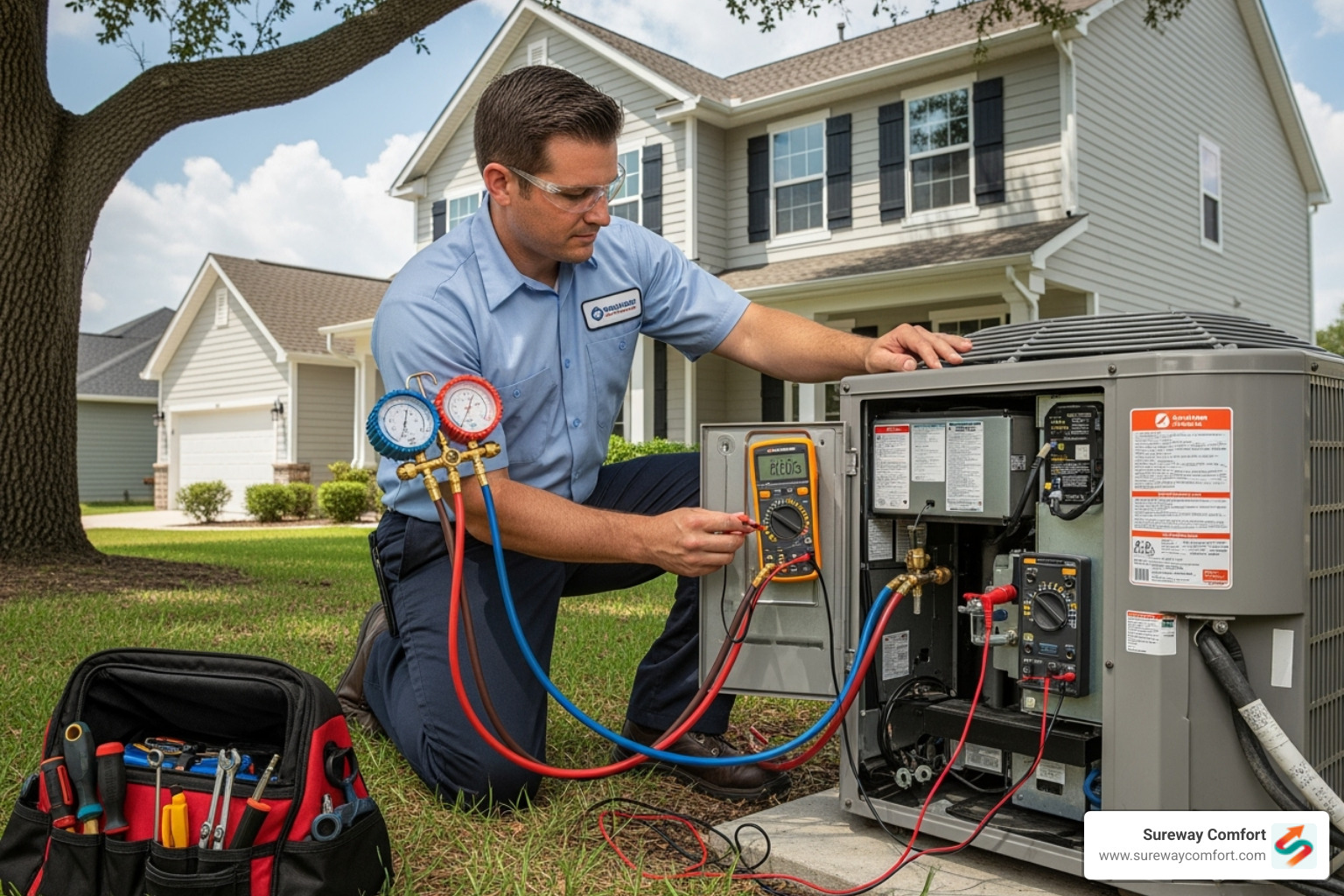
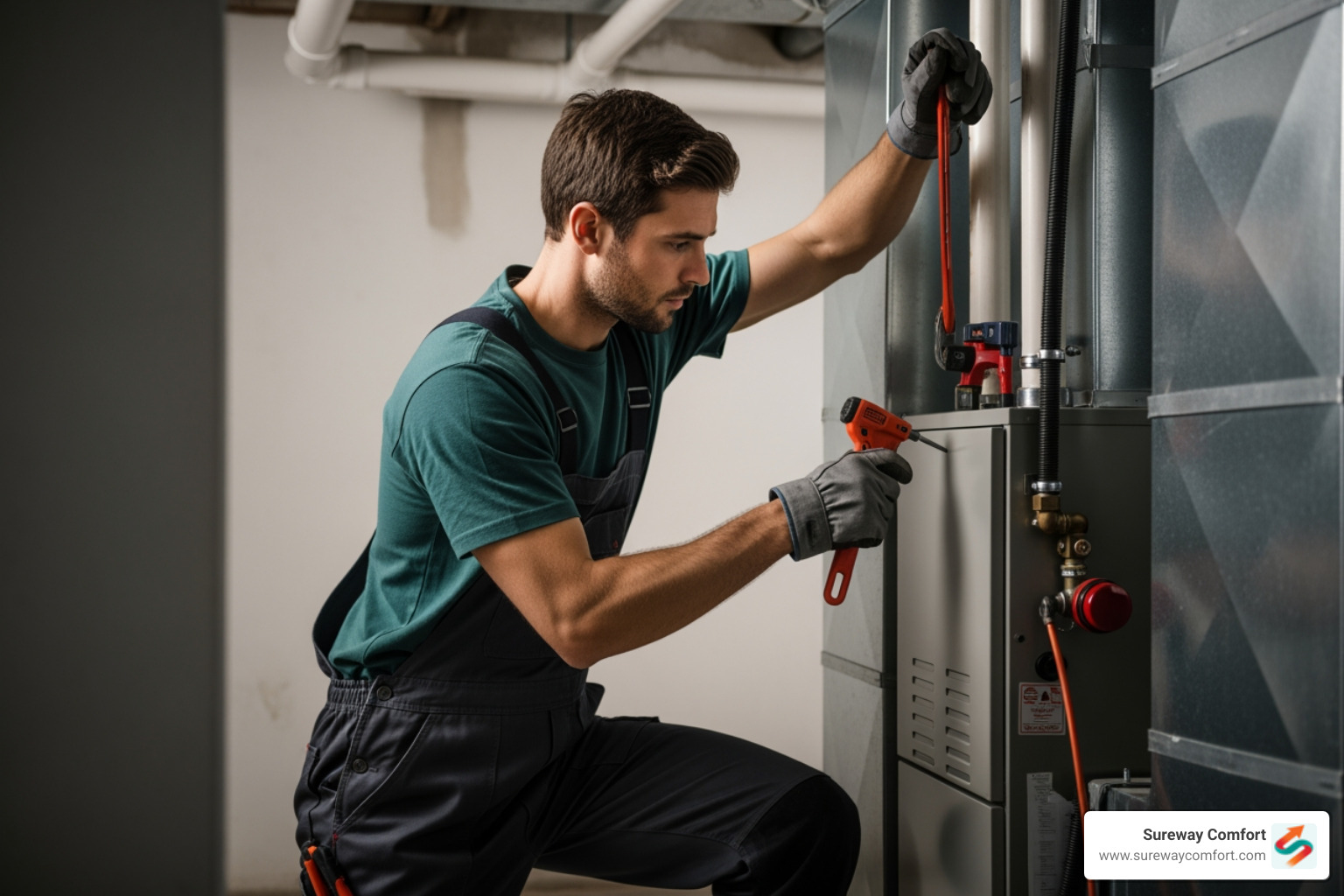

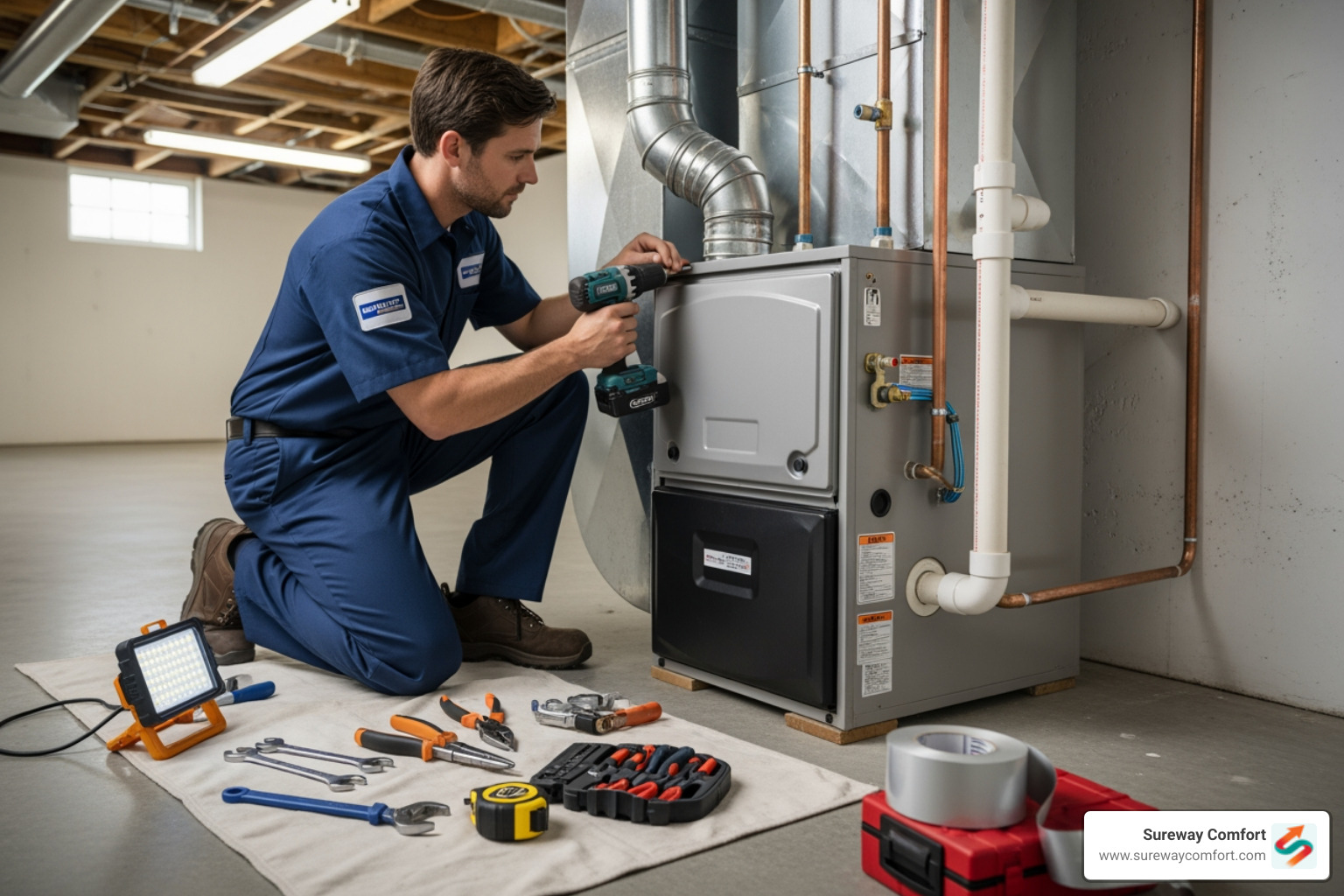
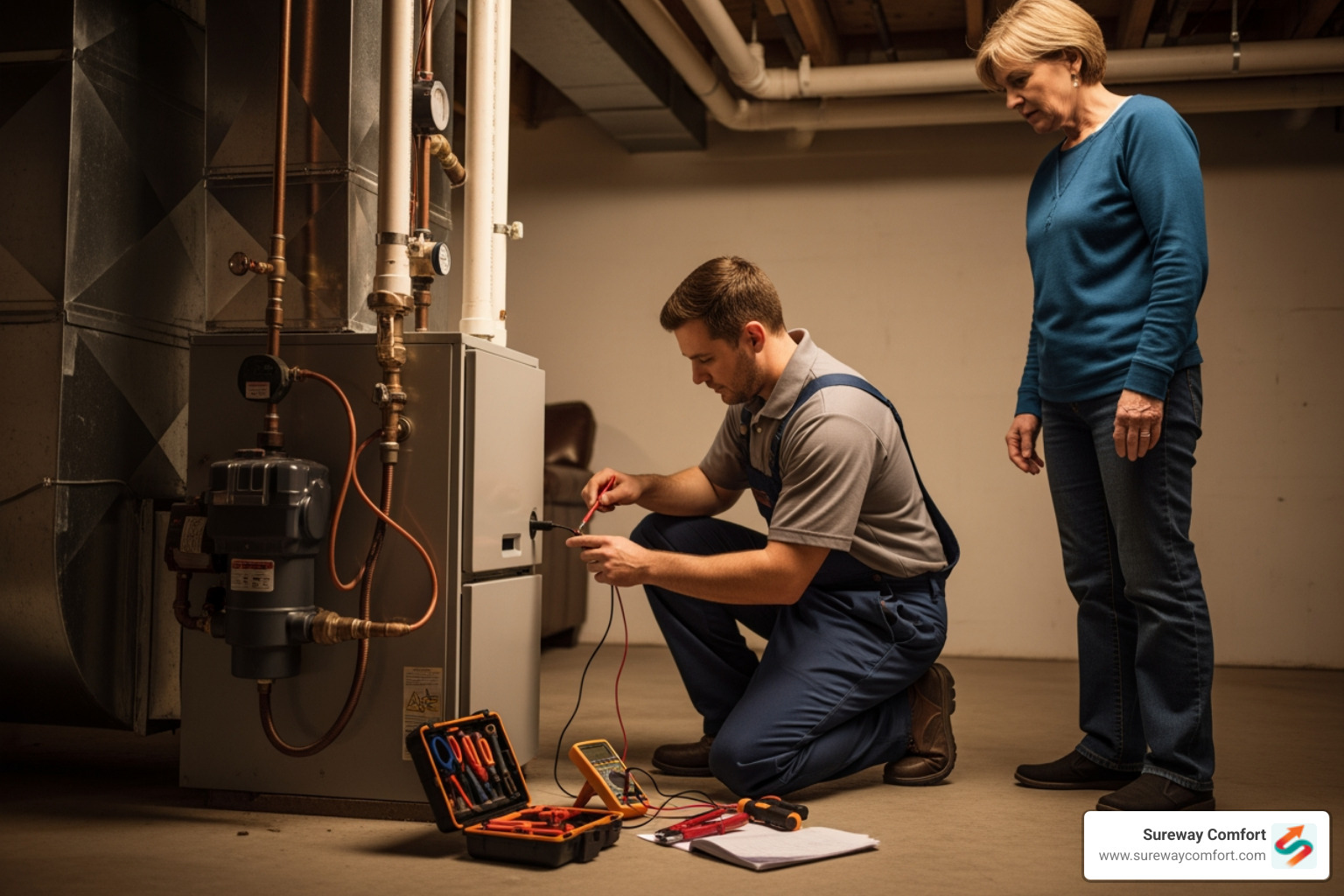




















.avif)



